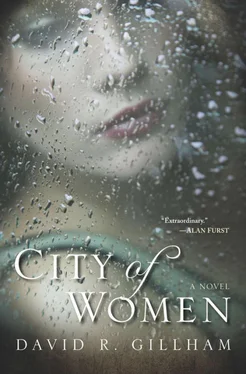“That’s a terrible story, Kaspar,” she offers quietly.
And for an instant, he seems to actually see her again. Long enough for her to see him drowning in the depth of his own gaze. “No. That’s a story of stupidity. But if you’d like to hear a terrible story, I have one of those, too.”
She is not sure she does, but Kaspar does not wait for her permission. “It was August. Very hot. The air was so heavy with dust it was choking. We had been given orders by battalion to secure a little town west of Zubtsov. Just a village, really, I couldn’t tell you its name, but it had cost us. I mean, cost us dearly . Ivan simply didn’t want to give it up. They were NKVD frontier troops, and they fought like mad dogs. We took it, lost it, then took it back again. Three days it went like this, back and forth, three days straight, with no sleep, no food, only fighting. Then, finally, the panzers arrive, and the Ivans evacuated. But what they left behind,” he says, “it was inhuman. They had taken prisoners. Eleven of them, two from my company. We found their bodies, stripped naked, mutilated. Heads crushed in. Entrails exposed. Genitals sliced off and stuffed into their mouths.” He pauses, gazing up at the ceiling, as if he were seeing it all there. “What we felt, when we found them? I can’t explain. It was more than rage. It was more than grief. It was something that has no name.”
He stares.
“That night we found a cache of vodka that the Reds had left, and got very drunk. Very drunk, and decided that such a crime couldn’t go unpunished. So we assembled and went back into the village. Three squads of men. We rousted everyone out of their shacks. Women, children, young and old, and forced them into an empty horse barn. Then we boarded shut the doors,” he says, gazing, “and set the barn on fire.”
Silence.
“It took an hour before the screaming stopped, though it seemed much longer. At one point, there was a woman. A woman who had dug a hole under the barn with her hands, and tried to squeeze her child out. But when we saw them, we opened up and cut them into pieces.”
Sigrid does not move. She cannot move. She can only listen as the tears roll down her cheeks.
“I cannot explain it, Sigrid. I will never be able to explain it. But at that instant, I believed they were guilty . All of them. Even the woman and her child. I believed they were all,” he whispers, “less than human.”
Quietly, Sigrid rises from the bed. Kaspar does not try to stop her. He does not seem to notice. In the bathroom, she manages to turn on the cold water tap to wash her face, but then can only glare at the water swirling down the drain. When she looks up, the mirror above the sink holds an image of a stranger. Hair dangling. Eyes like stones.
THEY HAVE RETURNED to the bench in the Tiergarten near the Lutherbrücke. There’s a raw, damp wind blowing, following the Spree up from the lakes and riffling through the limbs of the poplars and black chestnuts. Ericha is bundled in a ragged jacket, and her shoes are starting to display a certain shabbiness from constant wear. The leather cracked. The sole separating from the uppers at strategic seams. She attempts to strike a match for her cigarette. No sign of Franz, but this time Sigrid does not mention him. Finally the match catches and Ericha lights up. A shiver passes through her body like a wire.
“What happened to the warm coat you had?” Sigrid asks, but Ericha only shrugs off such a question. Avoids eye contact.
“Your hands and face are chapped.”
“I’m on the move a lot” is all the girl says. “Don’t worry about me. What do you have to tell me?”
“I have the money,” Sigrid answers. “For the ship passages.”
Finally Ericha looks at her.
“Don’t ask,” Sigrid tells her, stealing a drag from her bitter cigarette.
Ericha shakes her head. “I wasn’t going to.” Her eyes have taken on the depth of the river as she accepts the cigarette back. Sigrid clears the long sidewalk leading off the bridge with another German glance, then digs into her bag. “Put this in your pocket,” she tells Ericha, and presses Melnikov’s envelope into the girl’s chapped hand. “There should be enough there for everything.”
Ericha quickly stuffs it into her coat, then stares into Sigrid’s face. “You see, Frau Schröder,” she says. “I wasn’t wrong about you.”
“Yes, yes. You have the Menschenkenntnis. So I’ve heard. Inside the envelope there’s also an address. Written on the back of a cigarette card.”
“An address?”
“Auntie can’t help you. It’s the address of someone who can.”
A moment of grayness. “You mean an abortionist?”
“Use some of the money. There’s plenty,” Sigrid tells her. “All you need to know is on the card.” But when she looks back at Ericha’s silence, she asks, “It’s what you want, isn’t it? Isn’t it what you want ?”
But Ericha only gazes at her, her face stamped with dread. “Will you come with me?” she finally asks.
“I can’t. I’d be a danger to you,” Sigrid tells her, after a German glance. “Do you recall the Kommissar from the cinema? He appeared at my work and questioned me in the director’s office.”
“Questioned?”
“About my relationship with you. I told him nothing, of course, but you can see how it makes me a liability. Even now it could be dangerous for us to be sharing this bench. I must have changed trains a half dozen times to make sure no one was following me.”
“And was there?”
“Not as yet,” she says with a glance over her shoulder. “At least not that I could see. But who knows what the Herr Kommissar has up his sleeve? He could reappear at any moment and decide to cart me off. So I think this is the last time we should meet for a while.”
Ericha directs her gaze at the cracked slate of the sidewalk and smokes. Sigrid closes her eyes at the silence between them.
Then she hears, “I don’t care.”
“What?”
“I don’t care if you’ve been questioned. I don’t care if Heinrich Himmler is spying on you from your pantry closet. You’re no more a liability to anyone than I am. It’s me whom the Gestapo is after. I’m the danger.” And then she says, “I’ve been thinking about turning myself in.”
“Nonsense.”
“It’s not . If I give myself up to them, then the danger will be removed.”
“And what about the people you are hiding? The lives you have been protecting. Who will get them out ?”
“You will.”
Sigrid very nearly laughs. “Now, that is ridiculous.”
“I think it is not.”
“Ericha, you’re frightened. I understand. I am frightened, too. But those little girls, their mother. They need you . Not me. Not anyone else. Compared to you, the rest of us are just running errands.”
Ericha says nothing.
“You are not going to turn yourself in. Do you understand me, child? I will not permit it.”
Slowly, Ericha drops her cigarette and grinds it out. “You will never,” she says, “be a liability to me, Frau Schröder.”
———
The camera flash bleaches the room as Sigrid turns the key in the lock. There is a pretty girl, her dress hanging loose around her hips, naked from the waist up. She wears a mask of comic shock, clutching a handful of letters as Auntie’s former pension guest, Herr Kozig, now costumed in a postman’s uniform, cups her breasts from behind. Her hair is wrapped in gooseberry braids. Postman Kozig wears a grin below his postage-stamp mustache, as he leers down at the flesh he is fondling. It’s a bit of a shock to see him so employed, but Wolfram was right. The uniform carries him. Their eyes dart to Sigrid when she enters, but neither breaks his pose. They are obviously under strict orders.
Читать дальше












